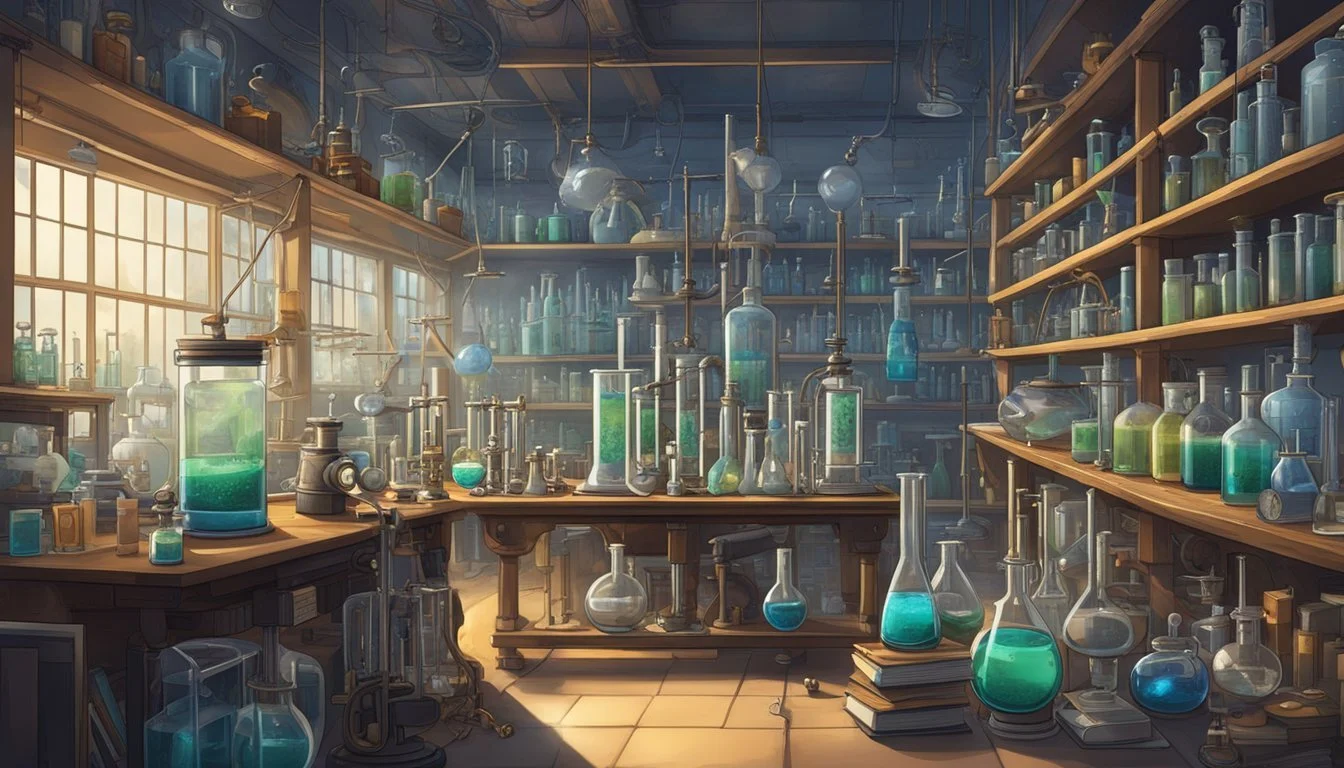6 Documentaries About Real-Life Mad Scientists and Their Creations
Exploring Brilliant Minds on the Edge of Sanity
Science has long captivated the public imagination, especially when it ventures into realms that seem to blur the lines between genius and madness. Throughout history, certain scientists have pushed the boundaries of ethics and sanity in their pursuit of knowledge and innovation. These individuals, often labeled as "mad scientists," have left an indelible mark on both scientific progress and popular culture.
Documentaries offer a compelling way to explore the lives and work of real-life scientists whose experiments and theories challenged conventional wisdom and sometimes crossed ethical lines. By examining the stories of these controversial figures, viewers can gain insight into the complex interplay between scientific ambition, societal norms, and the human psyche. From groundbreaking transplant surgeries to radical theories about the nature of reality, these documentaries shed light on the brilliant minds that have shaped our understanding of the world, even as they sometimes veered into territory that many would consider bizarre or unethical.
1) 'Einstein and Eddington' - BBC Film
'Einstein and Eddington' is a 2008 BBC television film that dramatizes the relationship between Albert Einstein and Arthur Eddington during World War I. The movie stars Andy Serkis as Einstein and David Tennant as Eddington.
The film focuses on Einstein's development of the general theory of relativity and Eddington's efforts to experimentally prove it. It portrays their scientific collaboration against the backdrop of wartime tensions between Germany and Britain.
Directed by Philip Martin and written by Peter Moffat, the film explores the challenges faced by both scientists as they pursue groundbreaking research. It depicts Einstein's struggles in Berlin and Eddington's expedition to observe a solar eclipse.
'Einstein and Eddington' highlights the power of scientific cooperation across national boundaries during a time of global conflict. The film received positive reviews for its portrayal of complex scientific concepts and historical events.
https://en.wikipedia.org/wiki/Einstein_and_Eddington
2) 'A Beautiful Mind' - John Nash
'A Beautiful Mind' explores the life of John Nash, a brilliant mathematician who struggled with schizophrenia. The film, directed by Ron Howard, portrays Nash's groundbreaking work in game theory and his battles with mental illness.
Nash's mathematical genius earned him a place at Princeton University, where he developed his equilibrium theory. This work later won him the Nobel Prize in Economics. The movie depicts his early academic successes and his appointment to MIT.
As Nash's career flourishes, he begins experiencing hallucinations and paranoid delusions. The film shows his descent into mental illness and the toll it takes on his personal and professional life. It also portrays his wife Alicia's unwavering support throughout his struggles.
The documentary emphasizes Nash's resilience and eventual recovery. It showcases his return to academic life and his continued contributions to mathematics. The film highlights the importance of understanding and supporting those with mental health challenges.
'A Beautiful Mind' offers a compelling look at the intersection of genius and mental illness. It celebrates Nash's intellectual achievements while sensitively portraying his personal struggles.
Wikipedia: A Beautiful Mind (film)
3) 'The Theory of Everything' - Stephen Hawking
'The Theory of Everything' is a biographical drama film released in 2014, directed by James Marsh. It portrays the life of renowned theoretical physicist Stephen Hawking, focusing on his academic career and personal relationships.
The film stars Eddie Redmayne as Hawking and Felicity Jones as his first wife, Jane. It begins with Hawking's time as a Ph.D. student at the University of Cambridge in the 1960s.
A pivotal moment in the story is Hawking's diagnosis with motor neuron disease at age 21. Despite the grim prognosis, he continues his groundbreaking work in physics with Jane's unwavering support.
The movie showcases Hawking's scientific achievements, including his research on black holes and the origins of the universe. It also delves into the challenges faced by the couple as Hawking's condition progresses.
'The Theory of Everything' received critical acclaim for its performances and portrayal of Hawking's life. It offers a unique glimpse into the brilliant mind behind some of the most influential scientific theories of our time.
[https://en.wikipedia.org/wiki/The_Theory_of_Everything_(2014_film)]
4) 'The Imitation Game' - Alan Turing
'The Imitation Game' is a 2014 biographical thriller film directed by Morten Tyldum. It portrays the life of Alan Turing, a brilliant British mathematician and cryptanalyst.
The film focuses on Turing's pivotal role in breaking the German Enigma code during World War II. His work at Bletchley Park significantly contributed to the Allied victory.
Turing's groundbreaking ideas laid the foundation for modern computer science. The movie explores his concept of the "Imitation Game," which later became known as the Turing Test.
The film also delves into Turing's personal struggles, including his prosecution for homosexuality in 1952. It highlights the injustice he faced despite his crucial contributions to the war effort.
Benedict Cumberbatch delivers a compelling performance as Turing, capturing both his genius and his social challenges. The movie received critical acclaim and multiple award nominations.
5) 'Man on Wire' - Philippe Petit
'Man on Wire' is a captivating documentary that showcases the audacious feat of Philippe Petit, a French high-wire artist. The film chronicles Petit's daring 1974 wire walk between the Twin Towers of the World Trade Center in New York City.
Directed by James Marsh, the documentary blends archival footage, reenactments, and interviews to tell the story of Petit's meticulous planning and execution of his unauthorized performance. Petit spent years preparing for this dangerous and illegal stunt.
On August 7, 1974, Petit stepped onto a wire suspended 1,350 feet above the ground, connecting the North and South towers. For 45 minutes, he walked, danced, and even lay down on the wire, captivating onlookers below.
The film explores Petit's obsessive personality and his unwavering determination to achieve what many considered impossible. It also delves into the complex logistics and teamwork required to pull off such a daring act.
'Man on Wire' won numerous awards, including the Academy Award for Best Documentary Feature in 2009. The film serves as a testament to human ambition and the pursuit of seemingly impossible dreams.
[https://en.wikipedia.org/wiki/Man_on_Wire]
6) 'Apollo 13' - NASA's Moon Mission
'Apollo 13' is a gripping documentary that chronicles NASA's harrowing 1970 lunar mission. The film captures the intense drama of the spacecraft's oxygen tank explosion, which occurred 200,000 miles from Earth.
Director Ron Howard masterfully recreates the nail-biting moments as the crew and mission control work tirelessly to bring the astronauts home safely. Tom Hanks delivers a compelling performance as Mission Commander Jim Lovell.
The documentary showcases the ingenuity and determination of the NASA team in the face of seemingly insurmountable odds. It highlights the innovative solutions devised to conserve power, remove excess carbon dioxide, and navigate the crippled spacecraft back to Earth.
'Apollo 13' serves as a testament to human resilience and problem-solving skills under extreme pressure. The film's attention to technical details and historical accuracy provides viewers with an immersive experience of this real-life space crisis.
https://en.wikipedia.org/wiki/Apollo_13_(film)
Understanding the Impact of Mad Science
Mad science has profoundly shaped modern science, popular culture, and ethical debates. Its influence spans centuries, leaving lasting impressions on technology, medicine, and social attitudes towards scientific progress.
Historical Context and Famous Figures
The concept of mad science emerged in the 19th century, coinciding with rapid scientific advancements. Mary Shelley's "Frankenstein" (1818) introduced the archetypal mad scientist, sparking public fascination and fear. Notable historical figures like Nikola Tesla blurred the lines between genius and madness, fueling the trope.
In the early 20th century, real-life events reinforced mad science fears. Nazi experiments and atomic bomb development showcased science's destructive potential. This period saw a surge in mad scientist characters in literature and film, reflecting societal anxieties about unchecked scientific progress.
Modern Implications and Ethics
Today, mad science influences debates on emerging technologies. Gene editing, artificial intelligence, and nanotechnology raise ethical concerns reminiscent of classic mad science scenarios. These fields promise great benefits but also pose potential risks to humanity.
Scientific institutions now emphasize ethical guidelines and oversight to prevent "mad science" scenarios. However, controversies persist, such as debates over human cloning and brain-computer interfaces. Public perception of scientists has evolved, with media portraying more nuanced depictions of researchers.
Mad science continues to inspire innovation. Some researchers embrace the "mad scientist" label, using it to drive creative problem-solving. This approach has led to breakthroughs in fields like renewable energy and medical treatments.
Science and Society: A Delicate Balance
The relationship between scientific advancement and societal norms presents complex challenges. Perceptions of researchers and the ethical implications of their work shape public discourse and policy decisions.
Public Perception of Mad Scientists
Popular media often portrays scientists as eccentric or dangerous figures. This image stems from fictional depictions like Dr. Frankenstein and real-life controversies surrounding scientific experiments.
Films like "Metropolis" (1927) cemented the "mad scientist" archetype in popular culture. The character Rotwang embodied fears about technology run amok.
Public attitudes toward scientists fluctuate based on current events and scientific breakthroughs. High-profile incidents can erode trust, while medical advances often boost scientists' reputations.
Education plays a key role in shaping perceptions. Science communication efforts aim to demystify research and highlight its benefits to society.
Scientific Innovation vs. Ethical Boundaries
Balancing scientific progress with ethical considerations remains an ongoing challenge. Breakthroughs in areas like genetic engineering and artificial intelligence raise complex moral questions.
Regulatory bodies and ethics committees provide oversight for research activities. Their role is to ensure experiments adhere to established guidelines and protect human subjects.
Scientists must navigate competing pressures from funders, institutions, and the public. Transparency in research methods and potential applications helps build trust.
Ethical debates often center on issues of consent, privacy, and potential misuse of technology. Finding common ground between scientific freedom and societal values is crucial.






